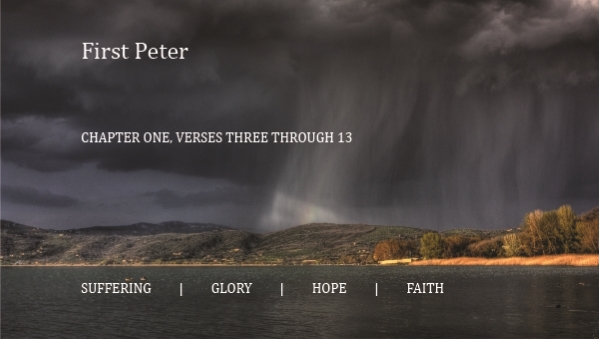By Tyson Thorne

Peter, due to his own impatience, understands as well as anyone how difficult it is to wait upon the Lord. In opening his letter he begins with acknowledging that, while we wait upon God for many things, we wait upon him for these four items in particular: Our future inheritance (verses three through 5), our deliverance from trials (verses six and seven), a glimpse of our savior (verses eight and nine) and for complete understanding (verses 10 through 13). The goal of our faith, which is constantly tested, is our salvation. That salvation is a great mystery and of great worth, is both secure and eternal, and will be made complete at the revelation of Jesus Christ.
It is important to understand the author’s premise for writing when attempting to read a letter. For this reason, most business letters have a “regarding” line, to let the reader understand from the beginning what the author is writing about. Therefore, in these ten verses Peter provides an overview to aid the reader in understanding his big idea. It is not surprising that Peter will spend the bulk of his time describing our salvation, since it alone provides us the hope to endure all the trials and persecutions which were upon the readers. In regard to this salvation, Peter points out that it is “precious,” even more precious than gold. This is because gold, though valuable, is also perishable, whereas our salvation is eternal, safeguarded by none other than Jesus Christ, the only Son of God.
Though more valuable than gold by far, it has at least one point in common with the precious metal: both are refined. Gold is refined by fire, our salvation by suffering for Jesus. The illustration Peter would bring to mind up a particular image for his readers. Throughout the Mediterranean area metalworkers used a primitive yet effective method of refining precious metals. They would fire up an intense flame and melt the metal in a sizable crucible. To the gold they would add all manner of impurities, including straw, and as the gold melted its weight would pull it down to the burning bottom of the crucible, whereas the impurities would rise to the surface or be burned up in the process. The metalworker would patiently and skillfully scrape the garbage from the top of the liquid. In a similar fashion, impurities and “garbage” in the believer’s heart are removed when the believer undergoes intense moments of persecution or hardship. Our own shortcomings and sinfulness are never clearer than in such circumstances, and can then be lifted from our lives.
Believers ought to exhibit hope, joy, and a willingness to suffer because they have received the precious and costly gift of salvation. In hope we show optimism in difficult circumstances, a clear vision for the future and excitement for Christ's return. In joy we have a heartfelt longing to glorify Jesus, are put at ease by knowing God is in control and rest easy in the security of our salvation. In our willingness to suffer we understand our identity, anticipate the world’s hatred and are prepared to be lovingly vulnerable to such hatred.
In Peter’s mind all things hold a purpose, even intensely evil things. In many ways this poetic description of our salvation begs the question: In what condition is your faith? Is it significant enough to overcome these hardships? Or is it puny, of little or no value? When one ventures into Christendom he ventures to discover the sufficiency of both his faith and his God.
THE NEXT POST IN THIS SERIES: https://think-biblically.com/10-lucubrations/192-foundation-of-a-holy-life
|
|
|
